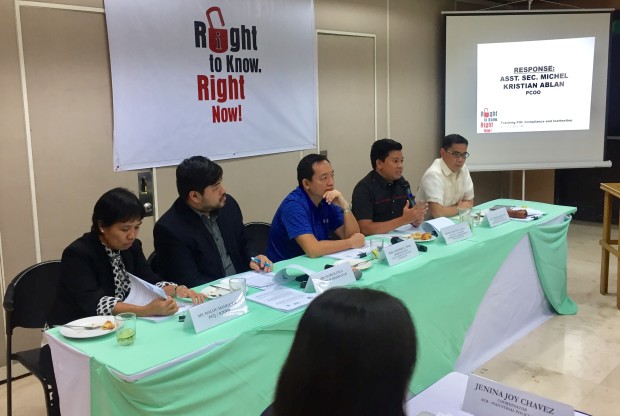FOI advocates raise concerns over EO implementation

Right to Know, Right Now! Coalition holds a forum on the implementation of the Freedom of Information executive order. (From L-R) Malou Mangahas of the Philippine Center for Investigative Journalism, Patrick Chua of the Makati Business Club, Representative Antonio Tinio of ACT Teachers party-list, Assistant Secretary Kris Ablan of the Presidential Communications Operations Office and Assistant Secretary Nepomuceno Malaluan of the Department of Education.
Freedom of Information (FOI) advocates on Friday raised concerns over the implementation of Executive Order no. 2, which was signed by President Rodrigo Duterte in July last year.
The Right to Know, Right Now! Coalition presented its findings based on a series of FOI requests, during a forum in Quezon City, moderated by veteran journalist Malou Mangahas.
While it lauded the government for issuing an EO and launching an FOI online request platform, the coalition said “the Duterte Administration’s work on the FOI front is far from done.”
Mixed response
In its presentation, the coalition revealed “mixed” performance of agencies covered by the EO. Some were prompt in responding to their requests while others “did not reply at all.”
Article continues after this advertisementIt said such findings prove that there is a need for an FOI law.
Article continues after this advertisement“The core value of any FOI initiative is how much it could effectively and efficiently assist and affirm the citizen’s right to access information, but also how far it could oblige and require state agencies and officials to disclose information,” it said.
“In both cases, or for both citizens and public officials, the process should be quick and easy, and the desired result, sunshine or full transparency,” it said.
The coalition pointed out that some agencies failed to comply with the Executive department’s deadline for an FOI Manual and a list of officers in charge of FOI requests.
“It took some agencies weeks and months on end to respond to requests, or well beyond the 15 working days deadline that the laws and EO No. 2 had imposed,” it said.
On the other hand, it highlighted the efforts of offices that responded promptly and professionally to queries.
“While they constitute only a minority of the agencies that had been approached by members of the Coalition, these offices deserve our highest commendation,” it said.
The Right to Know, Right Now! Coalition called on Duterte to push the “super majority” bloc in both the House of Representatives and the Senate to work for the passage of an FOI Law.
Assistant Secretary Kris Ablan of the Presidential Communications Operations Office (PCOO) also expressed support for an FOI law, which he said should provide for an independent office that would monitor FOI compliance of government offices.
Denied requests
The Philippine Center of Investigative Journalism, which is a member of the coalition, pointed out that of the more than 600 requests lodged in the eFOI website, 183 were denied. Only 166 were granted while 154 remained pending.
Among the agencies participating in the eFOI, the Department of Information and Communications Technology (DICT) had the largest percentage of denied requests with 20 requests denied from a total of 25 received requests.
The National Archives of the Philippines also denied 10 of its 19 received requests while the PCOO denied 41 requests out of the 52 it received.
Ablan said this is because they receive requests that should have been addressed to other agencies or offices.
Other agencies that had a large number of denied requests were the Department of Budget and Management (11 out of 37 requests denied), the Philippine Statistics Authority (39 out of 93 requests denied), the Department of Transportation (21 out of 53 requests denied), and the Department of Finance (10 out of 25 requests denied).
Joy Chavez, one of the convenors of the coalition, said that despite the perception that media will mostly benefit from the FOI, their study showed that less than five percent of the total requests from eight agencies came from media.
Many of the people who requested information were students, researchers and private individuals.
Exceptions
Chavez questioned the so-called “agency-determined exceptions,” which prohibited the release of information that may be under special laws, executive privilege, personal information, among others. Some agencies also included in the exceptions the Statement of Assets, Liabilities and Networth of public officials.
She said that while they “respect the right to privacy but there is option for redaction” or deletion of sensitive personal information from requested documents.
“The agency-determined exceptions should really be reviewed…it is actually an undermining of the EO and a violation of our right to access information,” she said.
Despite such concerns, the group said it offers a “pat on the back to public officials and civil servants in the Executive and Legislative branches who continue to labor tirelessly to ensure that we achieve big and small victories steadily and constantly in our shared journey to an authentic FOI regime.”